



Call Silver Star at 828-321-4268
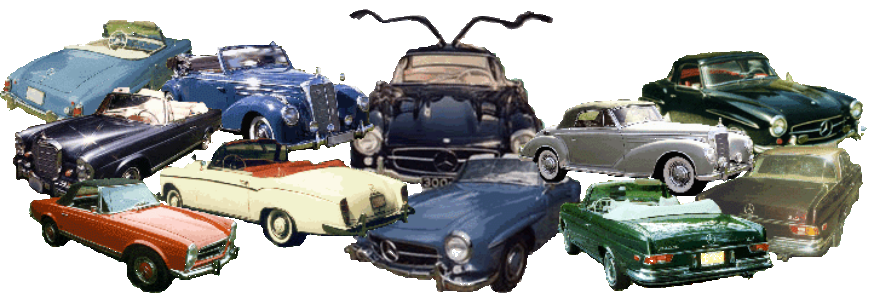

300SL Gullwing & Roadster 1954-1962

HISTORY of the 300SL
On the race track, the 300SL is a symbol of invincibility. This was it's intended function after all, to revive
Daimler Benz competition in racing. On the road, the 300SL is one of the most desirable automobiles ever
built. Because it was built for racing, the bodyshell was designed for aerodynamic efficiency. As a result, it
had flattened flanks, little imagination was applied to the front end, and there was a lack of trim.
Mercedes Benz did not originally want to build the
road going version of their famous racecar. A New
Yorker named Max Hoffman put in an order for 1000
vehicles and the road going version of the 300SL was
born. These first cars had a US sticker price of
$6820.00 rising to a final $8902.00 by the end of the
production run.
The road going version of the racecar was restyled.
Proven on the racetrack, the 300SL engine was
extremely reliable. The engine, slanted to the left
(see photo) was neccessary to accomodate the low
hood line. Oher changes and refinements included a
steel bodyshell with aluminum hood, trunklid, lower
rocker panels and doors to save weight. Chromed
bumpers were added. The slatted vents on the front fenders were there to allow excess heat from the
engine, but also added to the overall styling of the car. As do the "eyebrow" moldings over the wheel well
arches. The standard interior consisted of checked cloth fabric similar to that which was used on the racing
version. Leather of course was an option, as were fitted leather suitcases. All of the gullwing coupes were
built as left hand drive cars.
During the run of the gullwing coupe, 29 all aluminum bodied 300SL's were built for special delivery to rac-
ing customers. They had the plaid seats, plexiglass windows, Rudge wheels and an "NSL" engine.
The photo at right shows Rudolph Ulenhaut's
spaceframe chassis of the 300SL coupe.
The redesigned SL roadster was not
only functional, but breathtakingly
beautiful. Production of the 300SL
coupe began to wane as news of the
roadster began to spread. The roadster
was a road-going version that was a
revised car that fully addressed all the
bugs of the coupe. The roadster was
heavier and slower, but the styling was
much more civilized.The car had overall
the same appearance except for being a
convertible and the doors were front hinged. The front fenders on the roadster have larger cut-outs to
accomodate revised headlights with integral foglights, therefore front fenders on the coupe and roadster
cannot be interchanged.
There are quite alot of features on the roadster version, which were missing from the gullwing. The fuel
tank filler flap was moved to the outside of the left rear fender. Standard features were a Talbot racing
mirror, perforated and fluted leather upholstery, padded binnacle and top dash panel, improved heater
controls, more luggage space was achieved by cutting fuel tank capacity back to 31.7 gallons, a larger tail
light cluster with integral reverse lights, combination guage between the tachometer and speedometer,
handbrake lever moved from the left to the right of the driver, longer windshield wipers on reinforced
arms, foglamps, reinforced bumpers, glovebox, swing axle rear suspension, softtop or as an extra cost
option a hardtop.
If you are interested in buying one of these great cars, it is a must that you get a professional to inspect it
for you, after all, you are getting ready to spend six figures on an automobile. It is equally important to buy
the best car you can afford in today’s market. It is less expensive to buy a 300 SL Roadster or Gullwing in
great shape than it is to buy a ragged one and restore it. Restoration on these cars runs well into the six
figures. If you buy a nice one you can enjoy it next week!



Production Numbers:
Production Numbers of the 300SL gullwing coupe from August 1954 to May 1957
1954
146 units
1955
867 units
1956
311 units
1957
76 units
Total:
1400 units
Production Numbers of the 300SL Roadster from February/May 1957 to February 1963
1957
554 units
1958
324 units
1959
211 units
1960
249 units
1961
250 units
1962
244 units
1963
26 units
Total:
1858 units


Buying A 300SL
Know what you're buying and what to look for and know what to avoid.
When these cars are well maintained and properly taken care of, they increase in value.
PLEASE READ THIS FIRST!
A car's value is determined by condition. Standard condition guidelines are as follows:
Excellent- As close to perfect original or a very well restored vehicle. Generally a body-off restoration, but
a well done body-on restoration that has been fully detailed may qualify. The vehicle is stunning to look
at. Everything works as new, all equipment is original, NOS or excellent quality reproductions. PLEASE
KEEP IN MIND THAT # 1 CARS ARE VERY RARE, AND ARE ORIGINAL RIGHT DOWN TO THE HOSE CLAMPS.
DO NOT ASSUME THAT JUST BECAUSE A CAR HAS A #1 ASKING PRICE, THAT IT IS IN # 1 CONDITION.
MOST CARS FOR SALE OUT THERE ARE LOW # 2 TO HIGH # 3 CARS.
Very Good- An extremely presentable vehicle showing minimal wear, or a well restored vehicle. Runs and
drives smooth and tight. Needs no mechanical or cosmetic work. All areas have been detailed. Beautiful
to look at but clearly not a # 1 vehicle.
Good- Presentable inside and out with some signs of wear. Not detailed but clean. Body should be
straight and solid with no rust-through anywhere. Shiny, attractive paint but may have evidence of minor
fading or checking or other imperfections. Runs and drives well but may need some minor mechanical or
cosmetic work. But it is useable and enjoyable as is.
Fair- Runs and drives ok but needs work throughout the vehicle. Body shows signs of wear or previous
restoration work. Any rust should be minimal and not in any structural areas. Cosmetics, body and
mechanicals all need work to some degree.
Poor- In need of complete restoration, but is complete and not a rust bucket beyond repair. May or may
not run but is not roadworthy.
These values are from Collector Car Market Review and are based on actual sales of vehicles,
not on asking prices of vehicles. Asking prices, and sales prices are very different.
Currently: (these are approximate values based on actual sales of vehicles.) Prices last updated Sept 2019
300 SL
# 5
# 4
# 3
# 2
# 1
Gullwing Coupe
$451,000.00
$604,000.00
$910,000.00
$1,185,000.00
$1,611,600.00
Roadster (57-60)
$264,550.00
$485,500.00
$705,150.00
$920,000.00
$1,269,600.00
Roadster (61-63)
$280,000.00
$515,000.00
$745,000.00
$975,000.00
$1,345,000.00
























Keep in mind that due to the high cost of restoration, mint examples of these cars can and
have sold for more than the prices quoted here.
Condition of a car CANNOT be determined by its location. Don't be fooled by a car's current
geographical location. Just because a car is in California today, does not mean that is where it started
life.
Where to find the engine number and chassis number.
The chassis plate is attached to the engine firewall, another plate
and stamping is found on the left side front chassis leg close to
the tubular transverse member. (see photo right).
The engine number can be found stamped into the right hand
side of the cylinder block, and repeated on the alloy plate
attached below (see photo below).
Chassis number prefixs are:
300SL (racing version)
194010
300SL (production Coupe)
198040
300SL (aluminum Coupe)
198043
300SL (roadster)
198042
Engine number prefix is M198 (for all)
The 300 SL Gullwing and Roadster are a very low production automobile. Rarity is one of the main
ingredients which makes a car collectible. These fine automobiles have been collectible for a long time.
Since most auto enthusiasts take better care of their investments, most of the gullwings and roadsters
are in pretty good shape.
There are some gullwing and roadsters around which were haphazardly refurbished by some
unscrupulous individuals in the late 1980's to cash in on that crazy market.
We strongly suggest you get a qualified third party to inspect the 300SL of your dreams. Below is a
diagram for places to check for rust and previous rust repairs.



Please keep in mind that these cars were driven
hard when they were young. Let's face it, you buy a
sports car to drive it, therefore some of these cars
have been crashed, repaired, crashed again, and
repaired again. So check the car for accident
damage as well. Check the hood fit, headlight fit,
door fit, trunklid fit. Check the car on a lift and
inspect the tubular chassis for repairs. Park the car
on a level spot, step away from the automobile and
just look at the car from all angles.
Check the inner wheel aprons front and rear. Check for corrosion around the headlight buckets, wheel arches,
trunk floor, the areas behind the rear wheels and the rear roof pillars. (see photo below)


Techical Specifications
300 SL
Gullwing Coupe
Roadster
Engine Type:
6 cyl overhead camshaft (M198)
6 cyl overhead camshaft (M198)
Bore and stroke:
85 x 88 mm
85 x 88 mm
Displacement:
2996 cc
2996 cc
Power output:
215 hp@5800 rpm
215 hp@5800 rpm
Compression ratio:
8.55:1
9.5:1
Torque:
28 mkg @ 4600rpm
228 ft/lb
Fuel Injection:
Bosch injection pump
Bosch injection pump
Engine speed at 100km/hr:
3000 rpm
3000 rpm
Gear ratios:
I. 3.34:1
I. 3.34:1
II. 1.97:1
II. 1.97:1
III. 1.385:1
III. 1.385:1
IV. 1.00:1
IV. 1.00:1
Rear axle ratio:
3.64
3.64
Chassis:
tubular space frame w/ light alloy body
tubular space frame w/ light alloy body
Suspension:
independent front, swing axle rear with coil springs
independent front, swing axle rear with coil springs
Brakes and area:
drum, 1470 square cm
drum, 1470 square cm
Wheelbase:
2400 mm
2400 mm
Track front/rear:
1385/1435 mm
1398/1448mm
Length:
4520 mm
4570 mm
Width:
1790 mm
1790 mm
Height:
1300 mm
1300 mm
Ground clearance:
130 mm
130mm
Tires:
6.5 x 15 super sport
6.5 x 15 super sport
Turning circle:
11.4 meters
11.4 meters
Steering type and ratio:
recirculating ball, 17.3:1
recirculating ball, 17.3:1
Weight:
1295 kg (2849 lbs)
1330 kg (2926 lbs.)
Maximum speed:
145 mph
145 mph
Acceleration:
8.7 sec 0-100 km-hr
8.7 sec 0-100 km-hr
Fuel consumption
17 L, super (13.7 mpg)
17 L, super (13.7 mpg)
Fuel tank capacity
130 L (34 gal.)
130 L (34 gal.)

































































































- 220 Cabriolet A and 220 Cabriolet B 1951-1955
- 300 -300b -300c - 300d Convertible Sedan 1951-1962
- 300S - 300Sc Cabriolet / Coupe / Roadster 1951-1958
- 300SL Gullwing and Roadster 1954-1962
- 190SL Roadsters 1955-1963
- 220S / 220SE Cabriolets & Coupes 1956-1960
- 300SE Cabriolets & Coupes 1962-1967
- 220SEb/250SE/280SE/280SE 3.5 Cabriolets & Coupes 1961-1971
- 230SL/250SL/280SL Roadsters 1963-1971


© Silver Star Restorations is an independent shop and is
not affiliated with Mercedes Benz of North American or
Daimler Benz AG


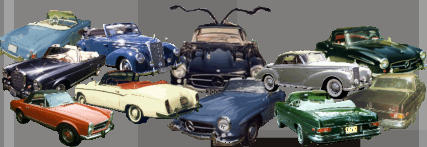
call Silver Star at 828-321-4268
300SL Gullwing & Roadster 1954-1962

HISTORY of the 300SL
On the race track, the 300SL is a symbol of invincibility. This was
it's intended function after all, to revive Daimler Benz competition
in racing. On the road, the 300SL is one of the most desirable
automobiles ever built. Because it was built for racing, the
bodyshell was designed for aerodynamic efficiency. As a result, it
had flattened flanks, little imagination was applied to the front
end, and there was a lack of trim.
Mercedes Benz did not originally
want to build the road going ver-
sion of their famous racecar. A
New Yorker named Max Hoff-
man put in an order for 1000
vehicles and the road going ver-
sion of the 300SL was born.
These first cars had a US sticker
price of $6820.00 rising to a final $8902.00 by the end of the pro-
duction run.
The road going version of the racecar was restyled. Proven on the
racetrack, the 300SL engine was extremely reliable. The engine,
slanted to the left (see photo) was neccessary to accomodate the
low hood line. Oher changes and refinements included a steel
bodyshell with aluminum hood, trunklid, lower rocker panels and
doors to save weight. Chromed bumpers were added. The slatted
vents on the front fenders were there to allow excess heat from
the engine, but also added to the overall styling of the car. As do
the "eyebrow" moldings over the wheel well arches. The standard
interior consisted of checked cloth fabric similar to that which was
used on the racing version. Leather of course was an option, as
were fitted leather suitcases. All of the gullwing coupes were built
as left hand drive cars.
During the run of the gullwing coupe, 29 all aluminum bodied
300SL's were built for special delivery to racing customers. They
had the plaid seats, plexiglass windows, Rudge wheels and an
"NSL" engine.
The photo at right
shows Rudolph
Ulenhaut's space-
frame chassis of
the 300SL coupe.
The redesigned
SL roadster was
not only func-
tional, but
breathtakingly
beautiful. Production of the 300SL coupe began to wane as news
of the roadster began to spread. The roadster was a road-going
version that was a revised car that fully addressed all the bugs of
the coupe. The roadster was heavier and slower, but the styling
was much more civilized.The car had overall the same appearance
except for being a convertible and the doors were front hinged.
The front fenders on the roadster have larger cut-outs to accomo-
date revised headlights with integral foglights, therefore front
fenders on the coupe and roadster cannot be interchanged.
There are quite alot of features on the roadster version, which
were missing from the gullwing. The fuel tank filler flap was
moved to the outside of the left rear fender. Standard features
were a Talbot racing mirror, perforated and fluted leather uphol-
stery, padded binnacle and top dash panel, improved heater
controls, more luggage space was achieved by cutting fuel tank
capacity back to 31.7 gallons, a larger tail light cluster with integral
reverse lights, combination guage between the tachometer and
speedometer, handbrake lever moved from the left to the right of
the driver, longer windshield wipers on reinforced arms, foglamps,
reinforced bumpers, glovebox, swing axle rear suspension, softtop
or as an extra cost option a hardtop.
If you are interested in buying one of these great cars, it is a must
that you get a professional to inspect it for you, after all, you are
getting ready to spend six figures on an automobile. It is equally
important to buy the best car you can afford in today’s market. It
is less expensive to buy a 300 SL Roadster or Gullwing in great
shape than it is to buy a ragged one and restore it. Restoration on
these cars runs well into the six figures. If you buy a nice one you
can enjoy it next week!
Production Numbers:
Production Numbers of the 300SL gullwing coupe from August
1954 to May 1957
1954
146 units
1955
867 units
1956
311 units
1957
76 units
Total:
1400 units
Production Numbers of the 300SL Roadster from February/May
1957 to February 1963
1957
554 units
1958
324 units
1959
211 units
1960
249 units
1961
250 units
1962
244 units
1963
26 units
Total:
1858 units
Buying A 300SL
Know what you're buying and what to
look for and know what to avoid.
When these cars are well maintained and properly taken care of,
they increase in value.
PLEASE READ THIS FIRST!
A car's value is determined by condition. Standard condition
guidelines are as follows:
Excellent- As close to perfect original or a very well restored
vehicle. Generally a body-off restoration, but
a well done body-on restoration that has been fully detailed may
qualify. The vehicle is stunning to look at. Everything works as
new, all equipment is original, NOS or excellent quality
reproductions. PLEASE KEEP IN MIND THAT # 1 CARS ARE VERY
RARE, AND ARE ORIGINAL RIGHT DOWN TO THE HOSE CLAMPS.
DO NOT ASSUME THAT JUST BECAUSE A CAR HAS A #1 ASKING
PRICE, THAT IT IS IN # 1 CONDITION. MOST CARS FOR SALE OUT
THERE ARE LOW # 2 TO HIGH # 3 CARS.
Very Good- An extremely presentable vehicle showing minimal
wear, or a well restored vehicle. Runs and
drives smooth and tight. Needs no mechanical or cosmetic work.
All areas have been detailed. Beautiful to look at but clearly not a
# 1 vehicle.
Good- Presentable inside and out with some signs of wear. Not
detailed but clean. Body should be straight and solid with no rust-
through anywhere. Shiny, attractive paint but may have evidence
of minor fading or checking or other imperfections. Runs and
drives well but may need some minor mechanical or cosmetic
work. But it is useable and enjoyable as is.
Fair- Runs and drives ok but needs work throughout the vehicle.
Body shows signs of wear or previous
restoration work. Any rust should be minimal and not in any
structural areas. Cosmetics, body and
mechanicals all need work to some degree.
Poor- In need of complete restoration, but is complete and not a
rust bucket beyond repair. May or may not run but is not
roadworthy.
These values are from Collector Car Market Review and are
based on actual sales of vehicles, not on asking prices of
vehicles. Asking prices, and sales prices are very different.
Currently: (these are approximate values based on actual sales of vehicles.)
Prices last updated Sept 2019
Keep in mind that due to the high cost of restoration, mint
examples of these cars can and have sold for more than the
prices quoted here.
Condition of a car CANNOT be determined by its location. Don't be
fooled by a car's current geographical location. Just because a car
is in California today, does not mean that is where it started life.
Where to find the engine number and chassis number.
The chassis plate is attached to the engine firewall, another plate
and stamping is found on the left side front chassis leg close to
the tubular transverse
member. (see photo right).
The engine number can be
found stamped into the right
hand side of the cylinder
block, and repeated on the
alloy plate attached below
(see photo below).
Chassis number prefixs are:
300SL (racing version) 194010
300SL (production Coupe)
198040
300SL (aluminum Coupe)
198043
300SL (roadster)
198042
Engine number prefix is M198 (for all)
The 300 SL Gullwing and Roadster are a very low production
automobile. Rarity is one of the main ingredients which makes a
car collectible. These fine automobiles have been collectible for a
long time. Since most auto enthusiasts take better care of their
investments, most of the gullwings and roadsters are in pretty
good shape.
There are some gullwing and roadsters around which were
haphazardly refurbished by some unscrupulous individuals in the
late 1980's to cash in on that crazy market.
We strongly suggest you get a qualified third party to inspect the
300SL of your dreams. Below is a diagram for places to check for
rust and previous rust repairs.
Please keep in mind that these
cars were driven hard when they
were young. Let's face it, you buy
a sports car to drive it, therefore
some of these cars have been
crashed, repaired, crashed again,
and repaired again. So check the car for accident damage as well.
Check the hood fit, headlight fit, door fit, trunklid fit. Check the car
on a lift and inspect the tubular chassis for repairs. Park the car on
a level spot, step away from the automobile and just look at the
car from all angles.
Check the inner wheel aprons front and rear. Check for corrosion
around the headlight buckets, wheel arches, trunk floor, the areas
behind the rear wheels and the rear roof pillars. (see photo below)
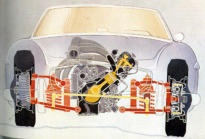




300 SL
# 5
# 4
# 3
# 2
# 1
Gullwing Coupe
$451,000.00
$604,000.00
$910,000.00
$1,185,000.00
$1,611,600.00
Roadster (57-60)
$264,550.00
$485,500.00
$705,150.00
$920,000.00
$1,269,600.00
Roadster (61-63)
$280,000.00
$515,000.00
$745,000.00
$975,000.00
$1,345,000.00


























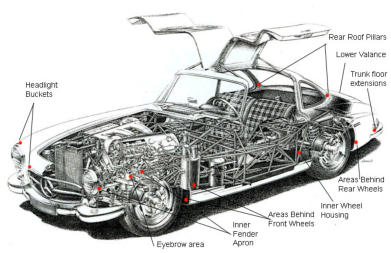
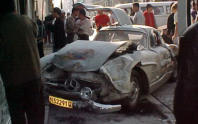

Techical Specifications
300 SL
Gullwing Coupe
Roadster
Engine Type:
6 cyl overhead camshaft (M198)
6 cyl overhead camshaft (M198)
Bore and stroke:
85 x 88 mm
85 x 88 mm
Displacement:
2996 cc
2996 cc
Power output:
215 hp@5800 rpm
215 hp@5800 rpm
Compression ratio:
8.55:1
9.5:1
Torque:
28 mkg @ 4600rpm
228 ft/lb
Fuel Injection:
Bosch injection pump
Bosch injection pump
Engine speed at 100km/hr:
3000 rpm
3000 rpm
Gear ratios:
I. 3.34:1
I. 3.34:1
II. 1.97:1
II. 1.97:1
III. 1.385:1
III. 1.385:1
IV. 1.00:1
IV. 1.00:1
Rear axle ratio:
3.64
3.64
Chassis:
tubular space frame w/ light alloy body
tubular space frame w/ light alloy body
Suspension:
independent front, swing axle rear with coil springs
independent front, swing axle rear with coil springs
Brakes and area:
drum, 1470 square cm
drum, 1470 square cm
Wheelbase:
2400 mm
2400 mm
Track front/rear:
1385/1435 mm
1398/1448mm
Length:
4520 mm
4570 mm
Width:
1790 mm
1790 mm
Height:
1300 mm
1300 mm
Ground clearance:
130 mm
130mm
Tires:
6.5 x 15 super sport
6.5 x 15 super sport
Turning circle:
11.4 meters
11.4 meters
Steering type and ratio:
recirculating ball, 17.3:1
recirculating ball, 17.3:1
Weight:
1295 kg (2849 lbs)
1330 kg (2926 lbs.)
Maximum speed:
145 mph
145 mph
Acceleration:
8.7 sec 0-100 km-hr
8.7 sec 0-100 km-hr
Fuel consumption
17 L, super (13.7 mpg)
17 L, super (13.7 mpg)
Fuel tank capacity
130 L (34 gal.)
130 L (34 gal.)





























































































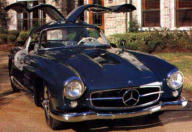



- 220 Cabriolet A and 220 Cabriolet B 1951-1955
- 300 -300b -300c - 300d Convertible Sedan 1951-1962
- 300S - 300Sc Cabriolet / Coupe / Roadster 1951-1958
- 300SL Gullwing and Roadster 1954-1962
- 190SL Roadsters 1955-1963
- 220S / 220SE Cabriolets & Coupes 1956-1960
- 300SE Cabriolets & Coupes 1962-1967
- 220SEb/250SE/280SE/280SE 3.5 Cabriolets & Coupes 1961-1971
- 230SL/250SL/280SL Roadsters 1963-1971













